French Wines
Boasting a legacy of winemaking that stretches back through many centuries, France continues to bear the international standard for the production of fine wine. Even more than the prestige and...Read More













































French Wine | The Gold Standard for Many Styles
Name the first three things that come to mind when you think of France, and chances are that wine will be one of them. For hundreds of years, the wines of France have set the international standard for quality, as the birthplace of so many styles now emulated around the world. A cornerstone of France’s economy and the source of great national pride, French wine is beloved not only for the sheer volume of bottles produced, or for the prestige of its most exclusive cuvées, but for the dazzling diversity of colours, grape varieties and styles on offer.
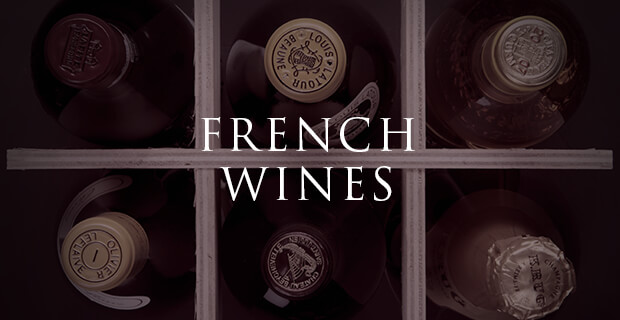
From the bold and powerful Classified Growths of Bordeaux to the luscious, pastry-scented sparklers of Champagne, the bright and age-worthy Rieslings of Alsace to the spicy, sun-kissed, leathery blends from the Rhone, there is a French wine to perfectly match any occasion, any dish, any mood.
The Extraordinary Historical Heritage of French Wine
The history of French wine production can be traced back to the 6th century BC, when the Greeks first began cultivating vines in the Mediterranean colony of Marseille, in today’s Provence region. When the Romans conquered the region, they developed viticulture even further and established vineyards all over the Roman Empire, including many of today’s leading French wine regions. Ancient Roman author Pliny the Elder wrote about viticulture in his Natural History, which remains one of the most important documents in French wine history.
During Middle Ages, the vineyards were cared for by Christian monks, who managed to conserve their savoir-faire through this tumultuous time period with the ample resources provided by the monasteries. Some of the most beloved wine regions of France, particularly Burgundy, owe their reputation today to the hard work and dedication of these monks. When the French Pope Clement V was elected in 1305, he moved the papacy of Rome to Avignon, where it would remain for a half century. During this time, the wines of Burgundy and the Rhône Valley (and particularly Chateauneuf-du-Pape) received plenty of attention as the Pope’s favourites. The prominence of Church-owned vineyards would come to an end as a result of the French Revolution, which led to the seizing and redistribution of land.
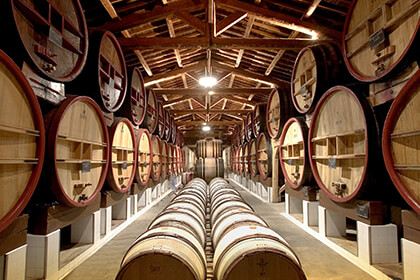
Between 1154 and 1453, the Aquitaine region (home to one of France’s most famous wine regions, Bordeaux) belonged to the English. During this time, trade between Bordeaux and England flourished, explaining the historical link between the two that still holds strong today. When Aquitaine was annexed by France following the Hundred Years’ War, the English were expulsed from the region and Dutch wine merchants took on a more prominent role.
It was during the Age of Enlightenment that the quality of French wines began to dramatically improve, with major educational institutions sponsoring studies on better viticultural and vinification methods starting in the 17th century. These improvements helped usher in a golden age of prosperity for French wines, a demand for which exploded with the emergence of the Parisian bourgeoisie class and advances in transportation. To show off the magnificence of French wines to the world, Napoleon commissioned the classification of Bordeaux wines for the 1855 Paris Exposition. During this time, French wine became a source of great national pride, not to mention a cornerstone of the country’s economy. Bordeaux and Burgundy officially became the international standards for wine production.
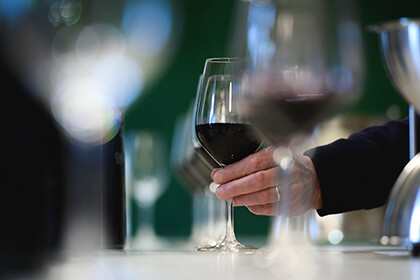
These glory days came to an end in the second half of the 19th century, which brought wave upon wave of devastation to the vineyards of France. First, a fungal disease known as downy mildew attacked the vines starting in 1878, followed by black rot in the 1880’s. And worst of all, the phylloxera vine louse wiped out around 40% of French grape vines in just 15 years. Vineyard owners were faced with the arduous task of replanting their vineyards to phylloxera-resistant American rootstock, which not all could afford.
Shortly after phylloxera came the economic downturn of Europe and two World Wars, which left many of the wine regions of France desolate. Nevertheless, the Appellation d’Origine Controlée (AOC) system emerged in 1935, designed to protect French interests and spearheaded by Châteauneuf-du-Pape (which also became the first such AOC appellation of France). The economic revival following World War II provided great momentum for the renaissance of French viticulture, resulting in significant investments by private companies and families into the vineyards and cellars of France.
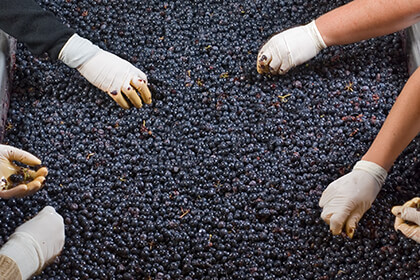
In the 1970’s France began to enter the “modern age” of its winemaking history, with many important technological advancements (sorting machines, temperature-controlled vats, etc.) made both out in the vineyard and in the winery. More than ever, it was time to reimagine and differentiate French wine in the face of growing competition from burgeoning New World wine regions. This time saw a significant stylistic shift in focus to quality and to the pure expression of a wine’s unique terroir and fruit characteristics in the glass.
In the past decade or two, several French producers have chosen to convert to sustainable, organic and biodynamic practices as a way to protect the natural environment, as well as the final consumer of their wines. And today, the winemakers of France continue this quest for quality, leading the way for the rest of the world in tackling the wine sector’s next great challenge: that of global climate change.
The Diverse Terroirs of French Wine and the Grape Varieties Grown There
The enduring international love affair with French wine stems not just from the sheer volume produced (estimated between 50-60 million hectolitres or 7-8 billion bottles per year) or the prestige and quality, but from the vast majority of styles. And this incredible diversity comes from the vast range of geographical, geological, topographical and climatic influences found throughout France.
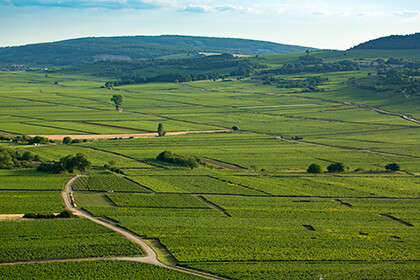
Champagne in northern France, for example, has one of the coolest climates of any wine region in the world, while the Rhône Valley in the south is one of the hottest. Bordeaux enjoys a maritime climate heavily influenced by the proximity of the Atlantic Ocean, while Burgundy is more continental with very hot summers and cold winters. Meanwhile, Provence is characterised by a distinctly Mediterranean climate. And there can truly be no two places more different than mountainous Franco-Germanic Alsace and the island paradise of Corsica.
A combination of climatic, topographical, geological and geographic influences shapes the specific terroir of a region, which dictates the grape varieties cultivated there. A majority of the most popular grape varieties, now planted around the world, are French in origin, including Cabernet Sauvignon, Merlot, Malbec, Syrah, Chardonnay, Pinot Noir and Sauvignon Blanc.
Some of the Most Beloved French Wine Regions and their Signature Styles
Today, France is home to over 300 different Appellations d’Origine Controlee (AOC). These appellations can be divided into several major French wine regions, out of which the best known are Alsace, Beaujolais, Bordeaux, Burgundy, Champagne, Languedoc-Roussillon, the Loire Valley, Provence and the Rhone Valley.
In the north-eastern corner of France, Alsace is a long and thin region, whose vineyards are scattered on the lower hillsides of the Vosges on a vast mosaic of soil types. Some 90% of the total wine production of Alsace is white wine, made as single-variety bottling of Riesling, Gewurztraminer, Pinot Gris and Sylvaner. The white wines of Alsace vary in style from bone dry to sweet. Nevertheless, they have in common several characteristics: a beautiful acidity, complex aromas and a remarkable potential for age. Alsace also produces some light-bodied and rustic Pinot Noir red wine and rosé wine. Some of the best known producers of Alsace include Trimbach, Zind-Humbrecht, Hugel and Marcel Deiss.
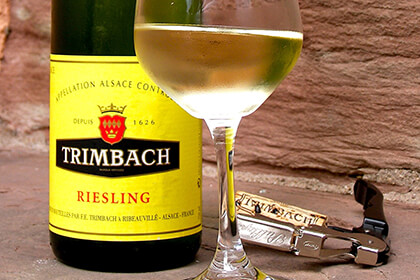
In eastern France, just south of Burgundy, Beaujolais is known for its youthful, easy-drinking Beaujolais Nouveau wines and its high-quality Beaujolais Villages wines, made predominantly with carbonic maceration of Gamay. Some of the best known producers of Beaujolais include Jean-Paul Brun and Château du Moulin-a-Vent.
In the southwest, the Bordeaux region is one of the most famous not only in France but in the world, best known for its prestigious Classified Growth chateaux. Roughly 90% of Bordeaux wines are dry red wines made from the “Bordeaux blend,” today widely imitated by wine regions everywhere. The Bordeaux blend comprises Cabernet Sauvignon, Merlot, Cabernet Franc, Petit Verdot, Malbec and Carmenere with most wines from Left Bank appellations (such as the famous Pauillac, Margaux and Saint-Julien) dominated by Cabernet Sauvignon, while most wines from the Right Bank appellations (Saint-Emilion and Pomerol) are dominated by Merlot. Bordeaux red wines are known for their powerful structure, dark fruit flavours, firm tannins and incredible potential for age. Bordeaux also produces some dry white wines (Bordeaux blanc secs) in the Graves and Entre-deux-Mers areas, as well as syrupy sweet dessert wines in Sauternes and Barsac. These white wines are typically a blend of Sémillon, Sauvignon Blanc and Muscadelle. Some of the most famous top wines of Bordeaux include the First Growths Château Margaux, Château Haut Brion, Château Mouton Rothschild, Château Latour and Château Lafite Rothschild.
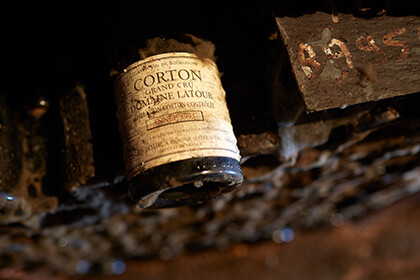
While Bordeaux is known for its blends, the Burgundy (or Bourgogne) region in the eastern interior of France produces single-varietal wines only, from either Pinot Noir, Chardonnay, Aligote or Gamay grapes. Perhaps more so than any other French wine region, Burgundy is known for its almost obsessive focus on communicating terroir in the glass. While there are some large négociant/producers who make large volumes of wine in a myriad of bottlings, Burgundy is best characterised by its tiny, family-owned estates. Burgundy wines come in a wide range of styles, from the chalky, mineral and very crisp Chablis Chardonnays to the fuller-bodied, nutty Meursault whites, not to mention the silky-smooth tannins, red fruit and earthy notes of a Burgundy red from the Cote de Beaune. Some of the best known producers of Burgundy include Louis Jadot, Louis Latour, Olivier Leflaive, Domaine Faiveley and, of course, Domaine de la Romanée Conti (producing the most expensive wine in the world).
Located at latitude 49°N, at the northern edge of the wine-growing band of the Northern Hemisphere, is Champagne, where the world’s most famous sparkling wines are made. In fact, the Champagne method for producing sparkling wine (with secondary fermentation occurring in the bottle) was invented here and is now imitated all over the world. Champagne is made from the region’s three flagship grapes - Pinot Noir, Chardonnay and Pinot Meunier – in a wide variety of styles, including Brut (the classic dry style), Blanc de Blancs (a white Champagne made exclusively from Chardonnay), Blanc de Noirs (a white Champagne made from red-skinned grapes) and pink Rosé Champagne. All Champagne spends at least 12 months ageing on its lees (dead yeast cells), giving it its characteristic creamy, yeasty aromas. Some of the best known producers of Champagne include Ruinart, Bollinger, Taittinger, Perrier Jouet, Veuve Cliquot, Dom Pérignon and Krug.
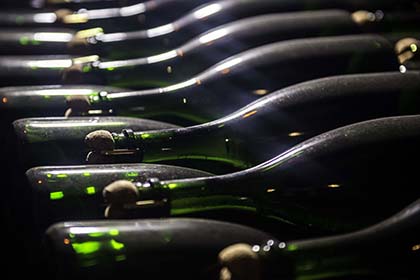
In the south, Languedoc-Roussillon is the largest wine region of France, stretching along the Mediterranean coast from Montpellier to the Spanish border with France, including the AOC’s of Banyuls and Minervois. Technically this region is a union of Languedoc, with a distinctly French history and Roussillon, which is influenced by Spanish and Catalan culture. Here the hot, dry Mediterranean climate produces bold red wines with hints of garrigue (the local brush flora of the region) from international varieties like Merlot and Cabernet Sauvignon and Rhône grapes like Grenache, Syrah and Mourvedre, as well as sweet red wines in Banyuls, fresh rosé wines from Cotes du Roussillon and even an ancient sparkling wine named blanquette de Limoux. The arrival of the railway system in the south of France greatly boosted the wine industry of Languedoc-Roussillon, whose quality wines continue to improve vintage after vintage. Today, Languedoc-Roussillon offers some of the best value for money. Some of the best known producers of Languedoc-Roussillon include Domaine Laroche, Domaine de l’Ostal, Mas Julien and Domaine les Aurelles.
In western France, the Loire Valley is known as the “Garden of France” for its lush green landscape punctuated by fresh rivers and rolling hills. The Loire is famous for its production of white wines, made from Chenin Blanc, Chardonnay and Sauvignon Blanc (most famously in the Sancerre and Pouilly-Fumé appellations). Loire valley reds are fruity, juicy and tannic, usually made from Cabernet Franc (the flagship red of the region, especially known from the Chinon and Saumur appellations), as well as Pinot Noir, Malbec and Gamay. The Vouvray appellation is, meanwhile, known for its beautiful sparkling wines, while the Muscadet wines of the Pays Nantais are made of Melon de Bourgogne and aged on lees. Some well-known Loire Valley producers include Famille Bourgeois, Alphonse Mellot, Domaine Vincent Pinard and Thierry Germain.
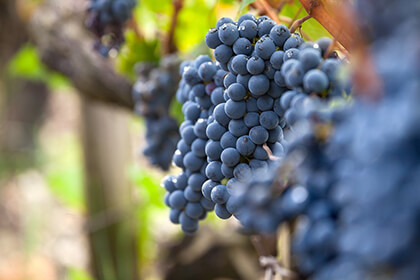
In the south-eastern corner of France, on the Mediterranean coast, Provence is characterised by a Mediterranean climate and cool Mistral winds that blow down from the Rhone River. Here, roughly 88% of wine production is dedicated to pale pink or onion-skin-orange rosé wines, produced in appellations like Côtes de Provence, Côteaux d’Aix-en-Provence and Côteaux Varois en Provence. However, the region is also home the appellations of Cassis (known for its ethereal white wines from Marsanne and Clairette) and Bandol (known for its spicy, oaky red wines and age-worthy rosé wines from the Mourvèdre grape). Some of the best known producers from Provence include Caves d’Esclans, Miraval, Minuty, Domaines OTT and Château Pradeaux.
And finally, the Rhône Valley in the southeast of France stretches north to south along the Rhone River and is home to a wide array of soil types. The northern Rhône specialises in single-variety red wines of Syrah (most notably from the appellations of Côte-Rotie, Hermitage and Saint Joseph), as well as white blends of Viognier, Marsanne and Roussanne (most notable from Condrieu). Meanwhile, the southern Rhône focuses on blended wines, including the “GSM blend” of Grenache, Syrah and Mourvedre. In the Châteauneuf-du-Pape appellation of the southern Rhône, the flagship Grenache grape can be blended with up to 18 different grape varieties, including red and white grapes. Some of the best known producers of the Rhône Valley include M. Chapoutier, Jean-Louis Chave and E. Guigal.